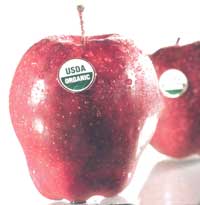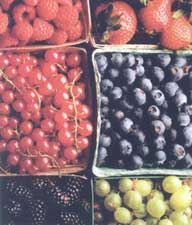Home » Practical Information » Health and Medical Concerns
Organic Living in Jakarta, Indonesia
What is organic?
Organic usually refers to all "naturally produced" foods or the product of organic farming. Organic food differs from conventionally produced food in the way it is grown, handled, and processed.
 Organic
usually refers to the raising of farm produce (fruits, vegetables, meats,
dairy products) without the use of chemical or other synthetic herbicides,
pesticides, fertilizers, (synthetic or sewer-sludge); livestock raised
with the use of growth hormones, or antibiotics; food processed without
ionizing radiation or food additives; nor can genetically modified seed
be utilized.
Organic
usually refers to the raising of farm produce (fruits, vegetables, meats,
dairy products) without the use of chemical or other synthetic herbicides,
pesticides, fertilizers, (synthetic or sewer-sludge); livestock raised
with the use of growth hormones, or antibiotics; food processed without
ionizing radiation or food additives; nor can genetically modified seed
be utilized.
A larger part of organic agriculture involves the health of the soil and the ecosystem in which crops and livestock are raised. Organic practices recognize that a healthy and live soil and ecosystem benefit crops. Natural, undisturbed soil is alive with microbiotic organisms which exist in harmony together with the native plant life and the inorganic minerals that provide the soil's substrate. Use of pesticides and other chemical treatments to plants disturb this natural balance in many ways and introduce man-made carcinogenic properties into the food supply.
In fact, organic farming is a more traditional form of agriculture. Before
the end of World War II, farmers did not use synthetic fertilizers and
pesticides made from petroleum products. Many technologies developed
during the war were found later to have positive effects on agricultural
production and thus  were
introduced beginning in the 1950s to farmers around the world. Fantastic
crop yields and great looking produce was achieved through use of the
chemicals; but little did people realize the resulting detrimental effects
on the health of consumers.
were
introduced beginning in the 1950s to farmers around the world. Fantastic
crop yields and great looking produce was achieved through use of the
chemicals; but little did people realize the resulting detrimental effects
on the health of consumers.
In developed countries the term “certified organic” is a legal term and means something quite different than organically grown as it is very difficult and expensive to have your products certified. Consequently, some small-scale western producers sell "organically produced" foods, but can’t make the full organic claim because they haven’t been certified by the organizations that are authorized to certify the foods.
The terms “natural” and organic are not interchangeable. Other truthful claims, such as free-range, hormone-free, and natural, can appear on food labels. However, don't confuse these terms with "organic."
Why choose organic?
There are many reasons why people are choosing organic foods over conventionally produced fruits, vegetables and other food products. In developing countries it is one of the fastest growing segments in the food industry with mainline retailers such as Safeway and Wal-Mart in the US and Waitrose in the UK and many others offering organic produce selections for their discerning customers. Organic food production and processing value now tops $50 billion/year, in the US alone.
A few of the more commonly held reasons for “going organic”:
- Organic food is not treated with any chemicals during the planting and growth of the item. Therefore, if you eat organic foods, you are not exposed to what could be a toxic cocktail of pesticides and fertilizers.
- Fresh organic produce has more vitamins, minerals, enzymes and other
micro-nutrients than conventionally farmed
 produce. Studies show that organic food contains between 50 and 100%
more minerals and 25% more fiber.
produce. Studies show that organic food contains between 50 and 100%
more minerals and 25% more fiber. - Choosing certified organic foods is a good way to avoid eating genetically modified food, because it is a requirement of certification.
- Choosing organic dairy or meat products ensures that the antibiotics, growth promoting drugs, anti-parasite drugs and many other medicines fed to the animals will not be passed on into your food.
- Organic produce often tastes so much better than farm produced vegetables and fruit. It’s full of flavor!
- Organic farmers often protect wildlife in their areas by not using harmful pesticides or herbicides and look for ways to protect their crops without harming wildlife and the environment.
- Conventional farming can damage workers' health as they are exposed to the toxins in the pesticides and herbicides and fertilizers.
Sustainably-grown foods and the environment
In addition to organic farming methods, sustainable agriculture is becoming more important around the world as we deplete the nutrients in over-farmed areas, endangering the ability of the soil to grow foodstuffs.
 Sustainable
agriculture refers to the ability of a farm to produce perpetually. An
important factor is the effects of farming practices utilized on soil
properties and processes essential for crop productivity. Practices that
can cause damage to soil include excessive tillage leading to erosion
and irrigation without good drainage leading to accumulation of salt in
the soil.
Sustainable
agriculture refers to the ability of a farm to produce perpetually. An
important factor is the effects of farming practices utilized on soil
properties and processes essential for crop productivity. Practices that
can cause damage to soil include excessive tillage leading to erosion
and irrigation without good drainage leading to accumulation of salt in
the soil.
A number of development and aid projects in Indonesia are working with local farmers to develop more sustainable methods of growing produce, to ensure that future generations will also be able to live off the land. These methods include natural replenishment of soil to avoid nutrient depletion. Just a few examples are:
- recycling crop waste and livestock or human manure
- growing legume crops and forages such as, peanuts that form symbioses with nitrogen-fixing bacteria called rhizobia
All of these efforts have one goal, to care for the earth by conserving the soil and water so that we can sustain and ensure the environment quality and therefore the health and well-being of future generations on the earth.
Where can you buy organic foods in Indonesia
 Specialty
health food stores can be found in larger cities in Indonesia, catering
mostly to an expatriate population and the increasingly aware educated
Indonesian that knows the need for a healthier diet and better choices.
Ask within the community to see if people are aware of a health food/organic/natural
food store where you live.
Specialty
health food stores can be found in larger cities in Indonesia, catering
mostly to an expatriate population and the increasingly aware educated
Indonesian that knows the need for a healthier diet and better choices.
Ask within the community to see if people are aware of a health food/organic/natural
food store where you live.
Try an organic restaurant and see how great organic food can taste! Ask the staff about the health benefits of the various dishes … and start to incorporate those new products/dishes into your daily life.
Fortunately for most expatriates, the wide variety of fresh produce and fruits, as well as the ready availability of household staff in Indonesia makes it very easy to incorporate a wide variety of fresh and healthy foods into your diet during your stay in Indonesia. Other items like organic medicines, juice, drinks, baby food, baby diapers grains and such are HARD to find and you will need to obtain them from an organic/natural foods store.
Traditional markets sell an astounding variety of produce, yet there is no way to know for sure if it is grown with organic methods. Sales people will tell you whatever you want to hear … or are not aware of the conditions under which the products were grown.
 The
effects of air pollution on foods grown near big cities is another factor
that must be considered.
The
effects of air pollution on foods grown near big cities is another factor
that must be considered.
Once you embrace the concept of “organic”, you’ll find that there are many areas of your life where changes to your lifestyle can improve your daily life. Organic products are not limited to food, but also include organically grown natural fibers used in clothing, nutritional supplements, personal hygiene products, household cleaning products, garden chemicals, and furniture. For each of these .. there is an organic option.
Making the change to organic living can be one of the most satisfying things you will ever do. Your health will improve, your energy levels will improve, your body functions will improve and you will look and feel better. There is no time like the present to begin!
Learn more about organic living ... there are many resources online. Knowledge and information replace fear; options empower us; and action will change not only our lives but the lives of generations to come. Eating well is one of the cornerstones of preventative medicine!
A few organic resources in Jakarta
YUM Organic Farm delivers vegetables to customers in Jakarta. All proceeds support the Yayasan Usaha Mulia orgphange and programs.
A few suggestions from members of the Expat Forum:
The Learning Farm in Puncak
Ranch Market, Megakuningan
Healthy Choice (Kompleks Graha Mas, Kebun Jeruk)
Some Bio (organic) Products at Hero or Food Hall
Warung Daun restaurants - locations in Kebayoran Baru and Menteng
Bali, of course, particularly Ubud, is a destination/residence of many yoga/'healing' types e.g., Bali Buddha on Jl Jembawan, Kafe on Jl. Hanoman, Nomad on Jalan Raya and Sari Organics up in the rice fields. There's an organic farmer's market on Saturday mornings at Pizza Bagus and Wednesdays at ARMA - some of the suppliers that sell there will home deliver.
Last updated Novewmber 27, 2023
